
2021–22

3 TABLE OF CONTENTS 4 Letter from the Director 5 Library Report 6 Bolivar House Visitors 7 Event Highlights CENTER FOR LATIN AMERICAN STUDIES (CLAS) TEAM Director Alberto Díaz-Cayeros Associate Director Elizabeth Sáenz-Ackermann Events and Communications Officer Sara Clemente Vásquez Academic and Student Services Officer Megan Bonilla Public Engagement Coordinator Molly Aufdermauer Curator for Latin American, Iberian & Mexican American Collections Adán Griego 10 Commencement2022 11 StudentFundingRecipients 14 FacultyFundingRecipients 14 FacultyPublicationsand Announcements 16 PublicEngagement 18 AlumniUpdates 19 Classof2023
Cover:HollyHenry,CLASM.A.'22, tookthisphoto“ThePowerof IguaçuFalls”inIguazuFalls,Brazil.
Above:YangranGao,CLASM.A.'22,capturedthisphoto,“Atthe MonumenttotheRevolution”inMexicoCity,Mexico.
These
studentphotosweresubmissionsfromtheannualStanford GlobalStudiesstudentphotocontest.
AlbertoDíaz-Cayeros
Thiswillbeabriefdirector’sletter,notduetoan uneventfulyearbutbecauseIwanttomakeasinglepoint thatmaygetlostinalongerexposition.BolivarHousehas continuedtobeathrivingspaceascanbeattestedby manyactivities,conferencesandevents,international visitorsandstudentsengagedinteaching,aswellas research,andoutreachtoourlocalandlarger communities.Iamparticularlyproudofthewayinwhich ElizabethSáenz-Ackermanndeftlykeptourcoursethrough stormyweatherandthewayourCLASteam,Sara,Megan, andMolly,workedtirelesslyduringthe2021-22academic yearwithacommitmenttothecenterthatgoesbeyond theirjobdescription–theyloveLatinAmericaandour community.Fromthatlovewehaveateaminplacethat canmakebeautifulthingshappen.
ThroughouttheyearIhavebeenconmovido–whichisnot quitetranslatable,sinceitmeans“tobemoved”butinthe companyoftheother,giventheparticle“con”–bytheway theindividualswhomakeupBolivarHouse,includingour team,students,andvisitors,arekind,patientand generous.Butletusalsorememberthatthetogetherness ofourphysicalspaceisonlymadepossiblebycustodial staff,gardeners,foodpreparers,deliverypersons, maintenancecrews,andserviceworkerswhooftengo unnoticedandhavemadeitpossibletorealizeacademic activitiesduring COVID-19.Wehavesurvivedaonce-in-alifetimepandemic,andweshouldrememberthepeople whomadethispossible.
ThisreflectiontakesmetotheAmericas.Thecounted deathtollfromtheWorldHealthOrganization’sofficial figuresinourhemisphereisalmostthreemillionlostlives (asofNovember12,2022):athirdoftheworldmortality figures.Themostaccuratestudies(forexample,aLancet studypublishedinApril2022)tellustherearemillions moreunregistereddeaths,sinceweknowexcessmortality isveryhighinplaceslikeMexicoandBrazil.Alongsidethe sorrowofsuchunimaginableloss,thisisatimetoalsobe grateful.Wemustthankthenurses,doctors,volunteers, healers,counselors,healthprofessionals,andfamily memberswhocaredforoursick.Wemustthankthe epidemiologists,virologists,medicalresearch-ers,public healthofficials,policymakers,andevensomepoliticians whohelpedputinplacevaccinesandnon-clinical measuresthatpreventedevenmoredeaths.Tlazocomati, obrigado,gracias,chaltumay!
ThecurrentEnlaceissue,hence,atteststotheresilienceof ourlocalcommunity,andforthatweexpressourgratitude: ourlibrarian,AdánGriego,continuedtomakethedigital andbookmaterialsthatnurtureourresearchandteaching accessible;wecontinuedourTinkerVisitingProfessorship andtheLatinAmericanPerspectivesLectureshipand broughtourfirstLuksicVisitingScholarstocampus;we carriedoutthevirtualseries“ConversationsonRaceand Ethnicity”withtheLatinAmericanStudiesAssociation sectiononEthnicity,Race,andIndigenousPeoples(ERIP) andtheCenterforResearchandHigherStudiesinSocial Anthropology(CIESAS)inpreparationforourin-person conferenceinMexicoCity;wegraduatedanothercohortof brightandpassionateM.A.students;ourfacultyand studentsorganizedconferences,workshops,andworking groups;andwecontinuedfundinglanguagetraining, internships,encounterswithauthors,teacheroutreach programs,andfieldresearchthankstothegenerosityofthe TinkerFoundation,theGranMariscaldeAyacucho Foundation,EdwardJ.andMargaretS.Soares,Monica MillerWalshandDavidWalsh,AnaPaulaPessoaTrejos,and theU.S.DepartmentofEducation’sTitleVINational ResourceCenterandForeignLanguageandAreaStudies Fellowshipsgrants.
Ourgratitudeextendstoeveryoneinourcommunityof learning,andallthepersonsthatarebehindthe institutionsandorganizationsthatmakeprogrammingat CLASpossible.

44 LETTER FROM THE DIRECTOR
After an 18-month hiatus, Stanford’s curator for Latin American, Mexican American & Iberian Collections, Adán Griego, returned to campus on September 13, 2021, ready to engage a group of scholars eager to consult the libraries’ vast Latin American collections, not to mention future users from the incoming class of 2025.
During the pandemic months, the libraries continued to receive research materials from the region. Likewise, as the region’s economies began reopening, publishing output also showed signs of renewed activity. Although scholarly publishing is a predominantly print-based industry, the months of confinement have shifted reading habits toward digital copies. It is likely that the industry will also move toward e-books, a trend that has started to be reflected in the libraries’ acquisition of online copies in Spanish and Portuguese over the last two years: 1600 and 335, respectively.
Inadditiontoe-books,thelibrariesaddedtheCubanPeriodicals: CulturalMagazinesdatabase,providingaccesstopublications fromtherenownedCasadelasAméricasorganizationforthe years1960-2009,whichincludethetheaterjournalConjunto,the musicjournalBoletíndeMúsica,AnalesdelCaribe,andCasade lasAméricas.Therearenowover70databaseswithscholarly contentfromandaboutLatinAmericaavailabletoStanford users.
GriegowasalsoabletoattendbookfairsinGuadalajara (November2021)andBogota(April2022).Hemetwiththe libraries’onsitevendors,makinganextensiverecorridothrough theexhibithallstofinditemsthatdefycommercialdistribution channelsandareonlyavailableatbookevents.


Duringthespringsemester,thelibrarieshadaspecialized presence(virtualandin-person)withGriegoasanembedded librarianforthewritingseminarcourseclassfortheLatin AmericanStudiesMaster’sprogram.Thestudents’finalprojects arenowarchivedintheStanfordDigitalRepositoryandare availabletobothinternalandexternalusers.

5
LIBRARY REPORT
Feria Internacional del Libro de Bogotá (April 21, 2022 ).
Feria Internacional del Libro de Guadalajara (November 27, 2021).
Recent books from Latin America arrive at Stanford Libraries (September 2, 2021).
BOLIVAR HOUSE VISITORS
Tinker Visiting Professors
Cristián Bellei Carvacho, University of Chile

Cristián Bellei is an associate researcher at the Center for Advanced Research in Education and a professor in the Sociology Department at the University of Chile, and a coordinator of the Research in Education Initiative at the Austral University of Chile. He is a Doctor of Education from Harvard University. He also has a sociology degree from the University of Chile and a master degree in education policy from Harvard University. Professor Bellei Carvacho taught SOC 238: Market Oriented Policies in Education (EDUC 238) in spring quarter 2022.
Claudia Nunes Duarte Dos Santos , Carlos Chagas Institute - Fiocruz
Claudia Nunes Duarte dos Santos received her B.A. in biology (1982), M.Sc. in genetics (1987), and Ph.D. in molecular virology (1994) from the Federal University of Rio de Janeiro. She obtained her post-doctoral degree from the Pasteur Institute in Paris (1995) and sabbatical professorship at the Rockefeller University (2018). Professor Nunes Duarte Dos Santos taught BIO 189: Emergent and Re-Emergent Viruses as a Global Threat to Human Health (BIO 289) in spring quarter 2022.



Latin American Perspectives Lecturer
Rosalva Aída Hernández Castillo, CIESAS Mexico
Rosalva Aída Hernández Castillo is a professor and senior researcher at the Center for Research and Advanced Studies in Social Anthropology (CIESAS) in Mexico City. At Stanford, Professor Hernández taught a graduate workshop on collaborative research and feminist ethnography and delivered a public lecture titled “Digging for Hope in Mexico: A Feminist Ethnography in the Land of Mass Graves”. Her academic work has promoted indigenous and women’s rights in Latin America.
Luksic Visiting Scholars
Enzo Sauma Santis , Pontifical Catholic University of Chile
Enzo Sauma is a professor at the School of Engineering and director of the UC Energy Research Center at the Pontifical Catholic University of Chile. He holds both Ph.D. (2005) and M.S. (2002) degrees in industrial engineering and operations research at the University of California, Berkeley. Professor Sauma also holds B.Sc. and M.Sc. degrees in industrial engineering from the Pontifical Catholic University of Chile. His interests include power systems economics, environmental economics, mathematical programming, energy efficiency, renewable energy, and energy policy.

Carolina Parra , Federico Santa María Technical University
Carolina Parra received her Ph.D. in applied physics from the Federico Santa María Technical University (USM) in Chile, (2009) and was a postdoctoral scholar at Stanford University (2013). Currently, Professor Parra is head of the interdisciplinary Laboratory of Nanobiomaterials within the physics department at USM (http://nanobiolab.usm.cl/) and is an associated researcher at the Technological Scientific Center of Valparaíso.
6
LectureSeries
CLAS’Fridaylectureseriescreatesaspaceforthegeneralpublictolearnaboutthevariouscultural,educational,artistic,andscientificdevelopmentsinLatinAmerica.Thisacademicyear,ourlectureserieswas heldinahybridcapacity.
Carolina Curvale
October 22, 2021
Ecuador During the Pandemic: New Government and Polarization
Sebastian Mazzuca
October 29, 2021
Alison Post
September 24, 2021City Size and Public Service
Access: Evidence from Brazil, India, and Indonesia
Kristof Gosztonyi
October 1, 2021
From Afghanistan to Apatzingán: Comparing Counter-insurgency and Counter-crime Militias in Afghanistan and Mexico
Vidal Romero
October 8, 2021
Security and Illegality in Cuba’s Transition to Democracy: Violence in the Hispanic and Lusophone Worlds
Cheyla Samuelson
Latecomer State Formation: Political Geography and Capacity Failure in Latin America
Ernesto Domínguez, Darsi Fernández, Sachie Hernández, and Mikael Wolfe
November 5, 2021
Cuba en el siglo XXI
Rosalva Aída Hernández Castillo
November 19, 2021
Digging for Hope in Mexico: A Feminist Ethnography in the Land of Mass Graves
Terry Karl
January 21, 2022
Mandates, Massacres, and Migration: The Politicization of Transitional Justice in Central America
Diana J. Montaño
April 15, 2022
Electrifying Mexico: Technology and Transformation of a Modern City
Carlos SchmidtPadilla
January 28, 2022
Gangs, Labor Mobility, and Development

Enzo Sauma
February 4, 2022
The Value of Flexibility in Long-term Energy Planning Decisions
Rebecca Herman


February 11, 2022
The Social Histories of U.S. Bases in World War II Latin America
Andrés Reséndez
October 15, 2021
Negotiating Alternative Narratives of Violence in Contemporary Mexico

Emiliana Cruz, Rosalva Aída Hernández Castillo, Suzi Hutchings, and Brian Noble
January 14, 2022
Transcontinental Dialogues Book Presentation

February 25, 2022
Conquering the Pacific
María Josefina SaldañaPortillo
April 1, 2022
La Reconquista: Indigenous Migrants and Their New Geographies of Mestizaje
J.Luis Rodriguez
April 8, 2022
Latin American Reactions to the Ukrainian Crisis
Javier Mejia
April 22, 2022
Modernizing Elites in Latin America: Social-network Evidence from the Emergence of Banking in Antioquia
Lynn Stephen
April 29, 2022
Stories that Make History: Mexico through Elena Poniatowska’s Crónicas
Claudia Nunes Duarte dos Santos
May 13, 2022
Hantavirus: Development of Novel Reagents for Improved Diagnosis and Prognosis Outcomes
Cristián Bellei Carvacho
May 27, 2022
Is There a Way Out of Neoliberalism? The Contentious and Uncertain Chilean Process to Transform a Market Oriented Educational System

7
EVENTS
EVENTS
Highlights
BelowareafewofthediversevirtualeventsthatCLASorganized,sponsored,co-sponsored,and/or fundedduringthe2021-22year.PleasevisitourCLASpasteventspageformoreinformation.
September 8-10, 2021
Conversations on Race and Ethnicity: Continuities and New Challenges in the Wake of the Covid-19 Pandemic

November 17, 2021
Collaborative Field Research and Feminist Ethnography Workshop
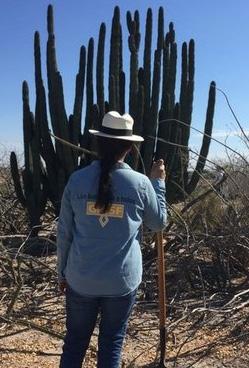

October 19, 2021
La justicia exiliada: el caso reciente de Guatemala

January 24, 2022
Indigeneity, Afro-descendants, and Other Marginalized Populations in Latin America
November 11, 2021
Conversations with Latin American Authors: Africanness in Action
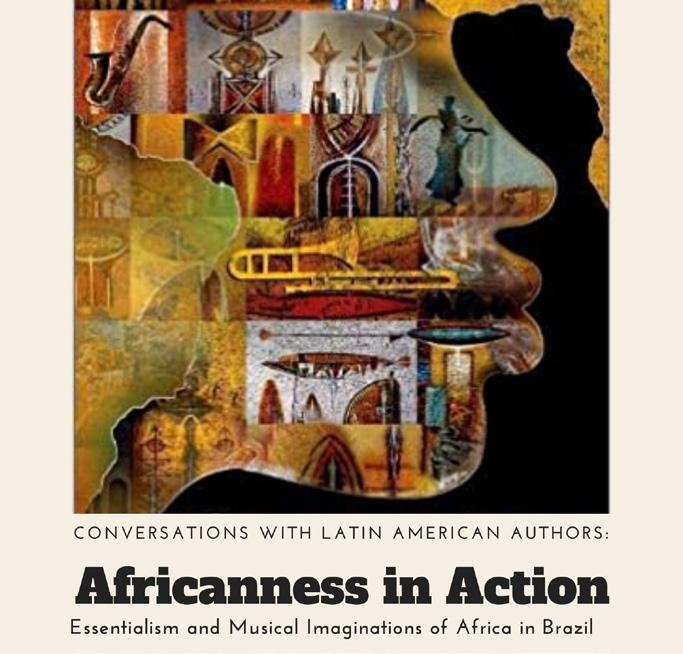
8
February 16, 2022
Contemporary Challenges in Latin America, presented by the Stanford Society for Latin American Politics


May 4, 2022
Queer Latinidades in Children’s Literature
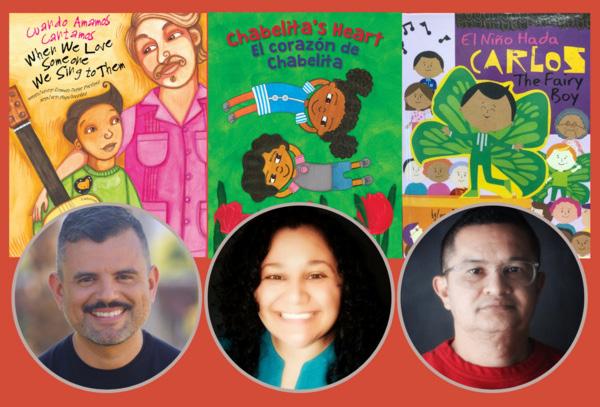
May 23, 2022
Cuba’s Life Task: Combating Climate Change (Documentary Screening)

May 20, 2022
The Queer Caribbean: Inheritance, Embodiments, and Possibilities

Friday, May 27
“Culture” and its Discontents in Early Modern Iberian Studies
10:00 am - 12:00 pm PST
Implied Geographies: Language as Culture in Viceregal Peru and Early Modern Spain, Leonardo Velloso-Lyons, Stanford University
Between Knowing & Reporting: Jesuits in Estado da India in the Sixteenth Century, Shruti Rajgopal, University College Cork
Failed Antiquity in La Florida, Nicole T. Hughes, Stanford University
1:30 - 2:45 pm PST
Collation and Persuasion: Knowledge Making in fray Bernardino de Sahagún’s Nahua Scriptorium, David H. Colmenares, Boston University
“Going Native”: On Cultural Particularity and Cultural Reductionism

Alexandra Cook, Columbia University
3:00 pm PST Response by Federico Navarrete Linares, UNAM (Universidad Nacional Autónoma de México)
Zoom https://stanford.zoom.us/j/99944682720?


pwd=Rkx2eG8vQzE2VHRLOFFYNkYrWGcvQT09 More info: nthughes@stanford.edu
May 27, 2022
“Culture” and its Discontents in Early Modern Iberian Studies
Passcode: 685043

9
COMMENCEMENT
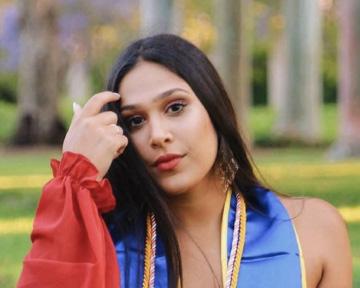
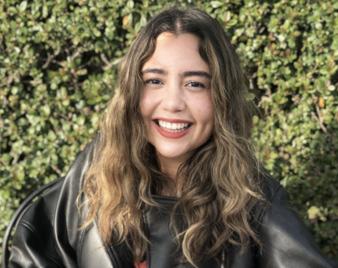
Congratulations to the Class of 2022!

June 12, 2022
CLAS M.A. Students
Julian Acevedo
Advisor: Héctor Hoyos
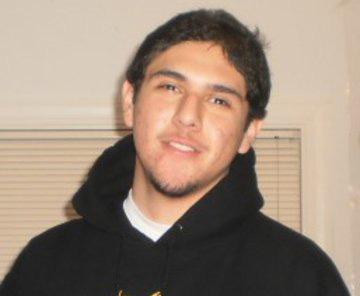

Sean Howard Gallagher
Advisors: Harold Trinkunas and Alberto Díaz-Cayeros
Eliza Stephanie Moreno
Advisor:
Zephyr Frank
Claudia Andrea
Bobadilla
Advisor: José David Saldívar
Isabella Caro Montini

Advisor: Beatriz Magaloni

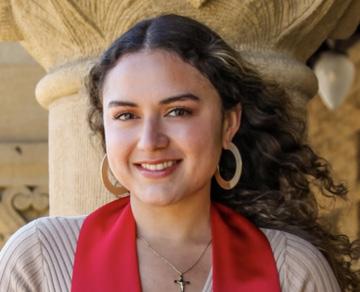
Holly Henry Advisors: Saumitra Jha and Julia W. Novy-Hildesley

Natasha Jain-Poster
Advisor: Zephyr Frank
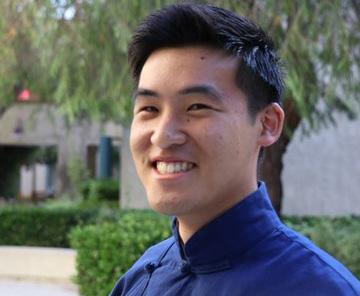

Shannen Torres
Advisor: Jonathan Rosa
Yangran Gao
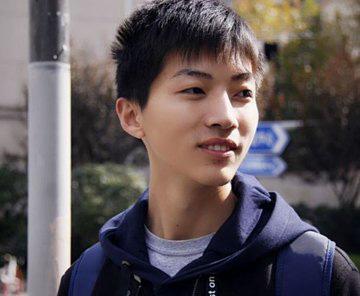
Advisor: Mikael Wolfe
Alberto Mora
Advisor: Tomás Jiménez
Harvey Arthur
Wang
Advisor:
Guillermo Solano-Flores
10
The classes of 2020, 2021, and 2022 with CLAS director Alberto Díaz-Cayeros (Left) and keynote speaker Paul Wise.
STUDENT FUNDING RECIPIENTS
CLAS offers research grants and fellowships, internships, scholarships, language study opportunities, and other funding options to students and visiting scholars both in the United States and abroad. The map below is a visual representation of the student research, study, and internships carried out in the U.S., Latin America, and the Caribbean.
Julian Acevedo, Claudia Andrea Bobadilla, Sara Mercedes Damore, Sean Howard Gallagher, Natasha Jain-Poster, Eliza
Stephanie Moreno, Shannen Torres
Stanford, CA
Davíd Morales, Esteban Salmón
Perrillia, María
Gloria Robalino
Mexico
Xavi Luis Burgos, Laura Menéndez
Gorina
Cuba
Xavi
Maria
Gloria Robalino
Ireland
Weronika
Tomczyk
Hungary
Luis Burgos
Dominican
Republic and Haiti
Luísa
Abreu Genes
Costa Rica
Anna Perronne
Ecuador
Jaime Landinez
Aceros
Colombia
Claudia Andrea Bobadilla, Maria RidgewayElsner, Natasha
Jain-Poster
Brazil
María de la Luz
Daniel
Chile
11
STUDENT FUNDING RECIPIENTS
Fellowships
Ayacucho Fellowship
The Ayacucho Fund was established with a generous gift from the Gran Mariscal de Ayacucho Foundation to award fellowships to graduate students at Stanford University.
• Julian Acevedo, M.A., Latin American Studies, ’22
• Isabella Caro Montini, M.A., Latin American Studies, ’22
• Kim Juárez Jensen, M.A., Latin American Studies, ’22
Foreign Language and Area Studies (FLAS)
Fellowships
CLAS administers FLAS fellowships for graduate and undergraduate students pursuing language training in less commonly taught languages of Latin America. FLAS fellowships are made possible with funding from the U.S. Department of Education under the auspices of Title VI of the Higher Education Act of 1965.
Academic Year 2021-22
Nahuatl Stanford University
•Claudia Andrea Bobadilla, M.A., Latin American Studies, ’22
•Shannen Torres, M.A., Latin American Studies, ’22
Portuguese Stanford University
• Julian Acevedo, M.A., Latin American Studies, ’22
• Sara Mercedes Damore, M.S., Community Health and Prevention Research, ’22
•Sean Howard Gallagher, M.A., Latin American Studies, ’22
•Natasha Jain-Poster, M.A., Latin American Studies, ’22
•Eliza Stephanie Moreno, M.A., Latin American Studies, ’22
Summer 2022
Portuguese University of Florida Language and Culture Program, Rio de Janeiro, Brazil
• Claudia Andrea Bobadilla, M.A., Latin American Studies, ’22
•Natasha Jain-Poster, M.A., Latin American Studies, ’22
Tulane University Summer in Brazil, São Paulo, Brazil
•Maria Ridgeway-Elsner, B.A., Civil Engineering, ’23
Soares Fellowships
The Soares Fund was established with a generous gift from Edward J. and Margaret S. Soares to provide fellowships to Latin American Studies graduate students at Stanford University.
• Claudia Andrea Bobadilla, M.A., Latin American Studies, ’22
• Maria Cristina Fernandez Escobar, M.A., Latin American Studies, ’22
•Holly Henry, M.A., Latin American Studies, ’22
•Sean Howard Gallagher, M.A., Latin American Studies, ’22
•Alberto Mora, M.A., Latin American Studies, ’22
•Hannah Smith, M.A., Latin American Studies, ’22
CLAS Internship Grant
Monica Miller Walsh Grants for Internships
Thanks to a generous gift renewal from Stanford alumna Monica Miller Walsh and her husband, David Walsh, CLAS was able to support undergraduate internships in Latin America for the eighteenth year in a row.
Paz y Esperanza, Guayaquil, Ecuador
• Anna Perronne, B.A., Undeclared, ’22
Student-Led Working Group Grants
Student working groups collaborate with a faculty sponsor to organize events, including lectures, speaker series, symposia, collaborative research efforts, and the exchange of working papers. CLAS awarded grants to the following student-led working groups for in-person and hybrid programming during the 2021-22 academic year:
Cafecito Quechua Working Group
Cafecito Quechua promotes Andean issues and cultures, inviting members to share their experiences with the region. Through weekly in-person meetings, Cafecito Quechua engaged the Stanford and wider Bay Area communities on Quechua language and culture. This working group brought together academics, organizations, and practitioners working on or researching the Andean region.
Student Coordinators:
• Adela Zhang, Ph.D., Anthropology, ’23
Faculty Sponsor:
• Marisol Necochea, Quechua Instructor, Stanford Language Center
12
Hemispheric Racializations: Ideologies, Enactments, and Communities

The Hemispheric Racializations working group seeks to engage interdisciplinary scholars in the study of ethnoracial formations throughout the context of the western hemisphere. As scholars with unique research on diaspora and homeland populations from Caribbean, Central American, and South American contexts, this working group aims to center voices and theories that may unsettle our current framings of race and racial formations and further the work of CLAS to advance knowledge that bolsters racial, social, economic, and environmental justice in the Caribbean, Latin America, and their diasporas.
Student Coordinators:
• Xavi Luis Burgos, Ph.D., Education: Race, Inequality, and Language in Education (RILE), ’27
•Marina Machado de Oliveira, Ph.D., Comparative Literature, ’27
• Alexandros Orphanides, Ph.D., Education: Race, Inequality, and Language in Education (RILE), ’26
Faculty Sponsor:
• Jonathan Rosa, Associate Professor, Graduate School of Education
Conference Travel Grants
CLAS provides funding for Stanford graduate students to attend and present on topics related to Latin America at professional meetings and conferences.
28th Annual Meeting of the European Association of Archaeologists (EAA), Budapest, Hungary
• Weronika Tomczyk, Ph.D., Anthropology, ’22
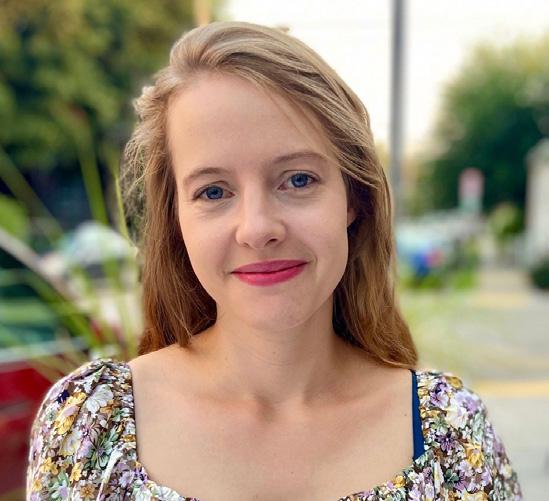
The Renaissance Society of America, Dublin, Ireland
• Maria Gloria Robalino, Ph.D., Comparative Literature, ’22
Weronika Tomczyk in Budapest, Hungary, at the Annual Meeting of the European Association of Archaeologists.
Field Research Travel Grants
CLAS supports Stanford graduate field research in Latin America.
Chile
• María de la Luz Daniel, J.S.M., Law, ’22 Research: Consumers’ Literacy and Decision-making: The Case of the Private Health Insurance Market in Chile
Colombia
• Jaime Landinez Aceros, Ph.D., Anthropology, ’24 Research: The Uses of Biodiversity: Technoscience and PostConflict Aspirations in Colombia
Costa Rica
• Luísa Abreu Genes, Ph.D., Biology, ’25 Research: The Role of Dispersal and Recruitment Limitation in the Recovery of Tropical Secondary Forests
Cuba
• Laura Menéndez Gorina, Ph.D., Iberian and Latin American Cultures, ’23 Research: Narratives of Homes in Modern Barcelona and Havana
Mexico
• Esteban Salmón Perrilliat, Ph.D., Anthropology, ’24 Research: The Administration of Impunity: An Ethnography of Criminal Prosecution in Mexico City
Tinker Graduate Field Research Grant
Thanks to the generosity of the Tinker Foundation, CLAS was able to support virtual field research for graduate students developing an independent research project and conducting preliminary field research in Latin America.
Cuba, the Dominican Republic, and Haiti
• Xavi Luis Burgos, Ph.D., Education: Race, Inequality, and Language in Education (RILE), ’27 Research: Sacred Epistemologies in the Caribbean: The Pedagogical Possibilities of Afro-diasporic Religions
Mexico
• Davíd Morales, Ph.D., Education: Race, Inequality, and Language in Education (RILE), ’26 Research: Towards a Theory of Intercambio: Social Justice Teaching and Movement-building Across Empire
Mexico
• María Gloria Robalino, Ph.D., Comparative Literature, ’24 Research: Heightened Worlds: Vertiginous Imaginaries in the Latin American Pacific
13
FACULTY FUNDING RECIPIENTS
CLAS Faculty-Led Events Grants
CLAS Faculty-Led Events Grants offers faculty and students from Stanford as well as from other institutions the opportunity to present their current research and explore topics of common intellectual concern.
Conversations on Race and Ethnicity: Continuities and New Challenges in the Wake of the Covid-19 Pandemic
September 8 - 10, 2021
Alberto Díaz-Cayeros, Senior Fellow, Freeman Spogli Institute for International Studies, and Professor, by courtesy, Political Science, Stanford University
Decolonial Theory and Praxis in Art, Film, and Media
May 19 - 20, 2022
Usha Iyer, Assistant Professor, Art and Art History, Stanford University
Emanuele Lugli, Assistant Professor, Art and Art History, Stanford University
Cuba’s Life Task: Combating Climate Change
May 23, 2022
Mikael Wolfe, Associate Professor, History, Stanford University
Groups in Conflict and the Legacies of Violence
May 26, 2022
Didi Kuo, Senior Research Scholar, Associate Director for Research, Center on Democracy, Development, and the Rule of Law, Stanford University
FACULTY
Publications

Vincent Barletta
(Co-editor) Unusual Gardens: Towards a Poetics of Cultivated Earth (Dibur Literary Journal; 2021)
Ximena Briceño
(Co-editor) Visiones de los Andes: Ensayos críticos sobre el concepto de paisaje y región (Plural Editores, 2021)
Enrique Chagoya
(Creator) Popol Vuh de la abuelita del Ahuizote (Magnolia Editions, 2021)
Rodolfo Dirzo
(Co-author) José Mario Molina: Life and Legacy of a Man Who Helped to Save Earth’s Ozone Layer (Proceedings of the National Academy of Science; 2021)
Héctor Hoyos
(Author) Narrativas de cadáveres e a teleologia da história da World Literature (Cadernos de letras; 2021, 63: 101-126)

(Author) The State of a Field in Five Books (Revista Hispánica Moderna; 2021, 74.1: 103-115)
(Author) Los iluminados (Tusquets Editores, 2022)
14
Herbert Klein
(Co-Author) Historia Social do Brasil Moderno (Imprensa Oficial of São Paulo, 2021)
(Co-author) Ensayos sobre Real Hacienda del Imperio Español (España, Mexico, Peru y el Rio de La Plata, Siglos XVI-XVIII) (Colección Itinerarios del Instituto Mora, 2021)
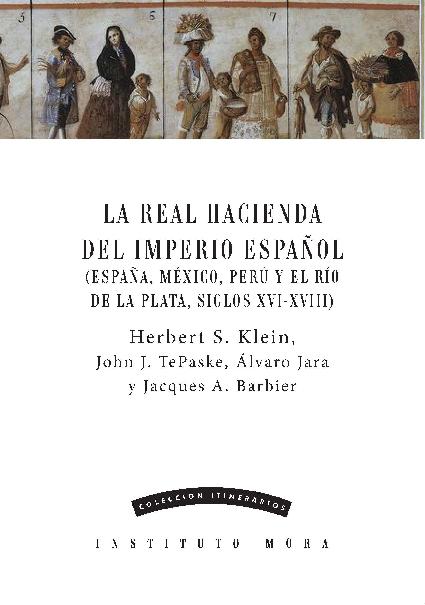
(Co-author) O tráfico legal e ilegal de escravos no Brasil no século XIX (Novos Estudos de História Econômica; 2022)
(Co-author) The Rise of Modern Maize Production in Argentina and Brazil (Historia Agraria: Revista de agricultura e historia rural; 2022, 86: 1-36)
(Co-author) The Development of a Modern Cellulose Industry in South America (Latin American Research Review; 2022, 57.4)
(Author) Social Change, Industrialization and the Service Economy in São Paulo, 1950-2020 (Stanford University Press, 2022)
Thomas Andrew O’Keefe
(Co-contributor) “Chapter 12: Energy Cooperation in South America: The Case of MERCOSUR.” Energy Law, Climate Change and the Environment (Elgar Publishing, 2021)
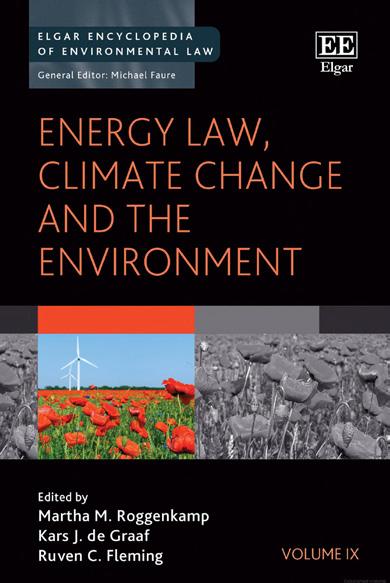
FacultyHighlights
VivianBratesreceivedtheFriendsofHaasAward fromtheHaasCenterforPublicServiceatStanford University.
EnriqueChagoyareceivedaJohnSimonMemorial FoundationGuggenheimFellowship.Hissurvey work“Borderless:Artist’sBooksbyEnrique Chagoya”wasexhibitedattheLegionofHonor MuseuminSanFrancisco,CA.Hiscollaborationwith KaraMaria“DoubleTrouble”wasexhibitedatthe SonomaValleyMuseumofArtinSonoma,CA.
GretchenDailywasappointedseniorfellow,by courtesy,attheFreemanSpogliCenterfor InternationalStudies,fortheperiodofFebruary1, 2022,throughJanuary31,2025.
HéctorHoyoswaspromotedtofullprofessorof IberianandLatinAmericanCulturesand,bycourtesy,ofComparativeLiterature.
GuillermoSolano-Floresservedasasteering committeememberontheStudyon ImplementationandUseofBalancedAssessment SystemsfromtheNationalAcademyofEducation forthe2021-2022period.
Guillermo Solano-Flores
(Author) Boolean Analysis of Inter-observer Agreement: Formal and Functional Evidence Sampling in Complex Coding Endeavors (Educational Measurement: Issues and Practice; 202, 40.2: 26-36)
(Author) The Semiotics of Test Design: Conceptual Framework on Optimal Item Features in Educational Assessment across Cultures, Countries, and Languages (Frontiers in Education; 2021)
(Co-author) Academic Achievement in a Language Revitalization Context: A study on the Influence of Language and Socioeconomic Factors (Journal of Multilingual and Multicultural Development ; 2021)
Mikael Wolfe
(Author) “Una revolución es una fuerza más poderosa que la naturaleza”: Fenómenos meteorológicos extremos y la Revolución Cubana, 1959-1964 (Historia Ambiental Latinoamericana y Caribeña (HALAC); 2021)
(Author) Book Review: Land, Liberty and Water: Morelos After Zapata, 1920-40 (Hispanic American Historical Review; 2021)
LyrisWiedemannwasrecertifiedasanAmerican CouncilontheTeachingofForeignLanguages (ACTFL)OralProficiencyInterview(OPI),Writing Proficiency Test(WPT),andOralProficiency Interview-Computer(OPIc)tester.
MikaelWolfewaspromotedtoassociateprofessor ofhistoryatStanfordUniversity.Hewasalso awardedaStanfordUniversityArtsandHumanities Off-CampusEnhancedSabbaticalFellowship.
15
A complete list of CLAS-affiliated faculty can be found at clas.stanford.edu.
PUBLIC ENGAGEMENT
CLAS is a U.S. Department of Education Title VI National Resource Center, receiving funding to further Latin American language and area studies at Stanford as well as in K-12 and community college education. The following professional development opportunities were developed and offered to K-12 and higher education educators throughout the 2021-22 academic year.
CLAS owes its success to its meaningful collaborations. Special thanks to our partners: Stanford Global Studies (SGS) programs and centers; Center to Support Excellence in Teaching (CSET, Stanford Graduate School of Education); Stanford Program on International and Cross-Cultural Education (SPICE, Freeman Spogli Institute for International Studies); Stanford World Language Project (SWLP, Stanford Graduate School of Education); Stanford University Libraries; Stanford Language Center; Center for Spatial and Textual Analysis (CESTA); Office of the Associate Vice Provost for Inclusion, Community and Integrative Learning Stanford History Education Group; Consortium of Latin American Studies Programs (CLASP); University of California, Davis Hemispheric Institute on the Americas; University of California, Los Angeles Latin American Institute; University of California, Berkeley Center for Latin American Studies; University of Utah Center for Latin American Studies; San José State University’s College of Education and Department of World Languages.
Educator Participation
K-12: 424
Língua Portuguesa Professional Development Program

This program brings together secondary and community college Spanish language instructors to study Portuguese language and culture with the goal of expanding Portuguese language programs in secondary and community college institutions. The 2021-22 course was led by native Brazilian Portuguese language instructor Valéria Caldas Vieira and included conversation practice sessions with Priscila Bordon.
October 2021 to May 2022
Summer Institute
2022 educator exchange program
Community College: 110
University: 77
“Intercambio DocenteEducador: Enseñanza, justicia social y docentes como activistas a través del imperio,” which took place throughout central Mexico. The program was led by Davíd Morales, a doctoral student in the Graduate School of Education and instructor in the Stanford Teacher Education Program. The program featured visits to various popular and alternative education projects in Mexico and brought together educators from urban and rural contexts in Mexico and California to discuss teacher activism, social justice pedagogy, and movement-building.
July 4 - 13, 2022
16
Nora Lorena Estrada, a traditional chef from Xochimilco who uses Indigenous techniques from the chinampas in her craft.
Américas Book Award Author Workshop
Indigenous Languages of Latin America Workshops

CLAS offers annual workshops for instructors of Indigenous languages of Latin America from universities across the U.S. and Latin America to discuss curriculum design, pedagogy, and the use of technology in the Indigenous language classroom. Workshops featured lesson demos and ongoing discussions on Indigenous language epistemologies and pedagogies.
December 4, 2021; May 13, 2022
Education Partnership for Internationalizing Curriculum (EPIC)
CLAS co-sponsored the 2022 CLASP Americas Book Award for Children’s and Young Adult Literature, awarded to Child of the Flower-Song People, written by Gloria Amescua and illustrated by Duncan Tonatiuh, and to My Two Border Towns, written by David Bowles and illustrated by Erika Meza. This year’s award activities included a virtual teacher workshop, a virtual award ceremony streamed over the Library of Congress’ YouTube channel, and the 2022 Global Read Webinar Series. The virtual workshop and webinars featured Américas Award-recognized authors Aida Salazar, Angela Burke Kunkel, Yamile Méndez, and Ernesto Cisneros, and author/illustrator Raúl the Third. CLAS also co-hosted a virtual author workshop with Stanford University Libraries and the Office of the Associate Vice Provost for Inclusion, Community and Integrative Learning: Queer Latinidades in Children’s Literature, led by Dr. Rigoberto Marquéz and featuring guest writers, scholars, and educators Ernesto Javier Martínez, Isabel Millán, and Juan Ríos Vega. Recordings of these events are available online.

October 11, 2021; February 3, March 22, April 13, May 4, May 18, and June 16, 2022
EPIC offers an annual series of outreach programs focused on strengthening the internationalization of curricula at community colleges and K-12 institutions. EPIC is a partnership between SGS area centers, CESTA, CSET, and SPICE. In 2021-22, EPIC welcomed 10 community college fellows and offered four multi-day courses, two workshops, a symposium, and a one-day fair for community college students interested in global studies and/or global careers. More information about these programs can be found at sgs.stanford.edu/outreach.
17
Ernesto Javier Martínez ‘98 presents his book Cuando amamos cantamos/When We Love Someone We Sing to Them during the Queer Latinidades in Children’s Literature workshop.
The 2022 Education Partnership for Internationalizing Curriculum (EPIC) Symposium was held at the Bechtel Conference Center on May 21. Photo credit: Rod Searcey.
Michael Adams (M.A. ’90) is the CEO of SAGE, a non-profit organization focused on advocacy and services for LGBTQ+ elders. He recently published an article on LGBTQ+ elders in Latin America in Revista: Harvard Review of Latin America and has shepherded the expansion of SAGE’s capacity-building work to support efforts of partners in Latin America and Asia.
Rolando Arango (M.A. ’80) retired as the CEO of Systems Architects Engineers.
Taylor Boas (Honors ’99) became chair of the Department of Political Science at Boston University on July 1, 2022. His book Evangelicals and Electoral Politics in Latin America: A Kingdom of This World is forthcoming with Cambridge University Press in early 2023.
Mary Boyer (M.A. ’16) welcomed a second baby into her family in November. Mary is continuing her Stanford CEE M.S. studies.
Humberto Cruz (M.A. ’12) is the director of Second Generation Programming at the Jeremiah Program.
John Dinges (M.A. ’77) published Los Años del Cóndor: Operaciones internacionales de asesinato en el Cono Sur (Penguin Random House, 2021). He was awarded the Orden de Bernardo O’Higgins by the government of Chile (President Bachelet’s administration).
Adriana Díaz-Ross (M.A. ’11) is a Spanish-language medical interpreter at the Nationwide Children’s Hospital.
Nathan dos Santos (M.A. ’21) went to Uzbekistan a second time to conduct an eco-engineering course with rural high school students. In April, he joined Human Rights First, an international nonprofit dedicated to assisting asylum seekers from Central America, Afghanistan, and Eastern Europe arriving at the U.S.-Mexico border. He was recently selected to participate in Viadrinicum 2022, a conference organized by Ukranian academics at the German-Polish border city of Frankfurt-Słubice about the role of the university as a societal actor in times of crisis/war. There, he will work with European University’s Planners.Lab to develop a transmedial oral history platform for the city’s refugee population.
Amelia Farber (M.A. ’16) moved to the United Kingdom to begin a Ph.D. program in the Department of Education at the University of Oxford. She is currently preparing for fieldwork in the Galapagos Islands, where she will be looking at student perceptions of local ecological knowledge and environmental learning. Recently, she was able to present her undergraduate and master’s research at the Conferencia Latinoamericana y Caribeña de Ciencias Sociales in Mexico City, and present a scoping review that she conducted on the presence of social science research on Galapagos at the Cambridge Department of Education Kaleidoscope Conference.
LibbyGlass(M.A.’13)earnedherJ.D.fromWakeForest UniversitySchoolofLaw.InSeptember2021,shestartedher roleasanattorneyatQuarles&BradyLLPinthefirm’sWashington,D.C.,office.Inthecomingmonths,shewillbeprovidingpro bonosupporttoAfghanasylumseekersintheU.S.
RicardoG.HuertaNiño(M.A.’96)isaseniorinitiativeofficer attheSanFranciscoFoundation,leadingstrategydevelopment andpartnershipstomovetheregiontowardsmoreequitable andsustainablehousing,transportation,landuse,andclimate resilience.Hecontinuestoteachcityandregionalplanning,and globalpovertyandpracticeasalecturerandChancellor’sPublic ScholaratUCBerkeley.
GustavoLisboaEmpinotti(M.A.’17)iscontinuingtopursue hisPh.D.inpoliticalscienceatNewYorkUniversity.
RaymundoLopez(M.A.’21)completedhisfirstyearofPh.D. studiesatMichiganStateUniversityandwasrecentlyawarded theJohnA.GarciaandDiversityScholarshipbytheInter-universityConsortiumforPoliticalandSocialResearch.Healso recentlypublishedavideoonATOMLaboratories(@atomlabs).
HariSeshasayee(M.A.’15) isaprolificwriter.Someofhis recentlypublishedworkincludes"LatinAmericaʼsTrystwiththe OtherAsianGiant,India,”and “UkraineWar:TheEconomic ImpactonIndia."Hewaswasonepisode72oftheRedline Podcast“CanEuropeSurviveWithoutRussianGas?”
JoshStech(M.A.’09)foundedSundae4yearsago,whichhas sinceraisedroughly$160Mofventurecapitalandemployed approximately500peopleinafullyremoteworkenvironment. SundaewashonoredbyForbesaspartofthecoveted“Next BillionDollarStartup”listandalsolandedahugepartnership withDr.Philinordertoreachmorehomeownerswhoneedhelp.
ThomasStelzer(M.A.’84)iscurrentlythedeanandexecutive secretaryoftheInternationalAnti-CorruptionAcademy.
MariaWalker(M.A.’17)isanattorneyattheOppenheimer InvestigationsGroup.
AlistofLatinAmericanStudiesalumnicanbe foundatclas.stanford.edu.
18
UPDATE
ALUMNI
CLAS THANKS OUR GENEROUS DONORS

The Center for Latin American Studies extends its sincere appreciation to our contributing alumni, parents, students, and friends for their generous support. Financial support provides core funding to strengthen our existing programs and help create new ones where needed.
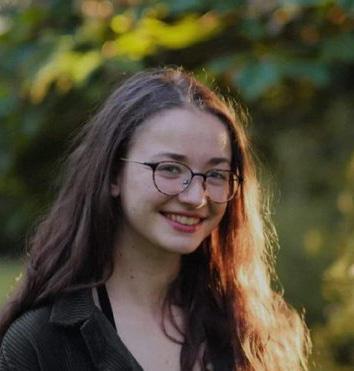







For more information about CLAS’ initiatives and to discuss advancing our academic community as we learn from and engage with the Americas’ diverse ethnic, linguistic, cultural, biological, and historical geographies, kindly contact Elizabeth Sáenz-Ackermann, CLAS associate director, at esaenz@stanford.edu.


CLAS WELCOMES THE
OF 2023 19
CLASS
Evan Lewis
Estefania Ramirez
Minah Choi Chris Maudlin
José Luis Sabau
Emilio Espinal
Maya Návar
Daniel Tovar Medina
Darrow Hornik
Annie Obernoster
Connect with us:
@StanfordCLAS
StanfordCLAS
latinamerica@stanford.edu
clas.stanford.edu
vimeo.com/clas
Center for Latin American Studies
Stanford University
582 Alvarado Row
Stanford, California 94305
clas.stanford.edu





























































